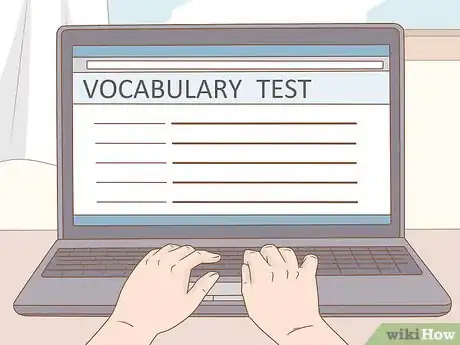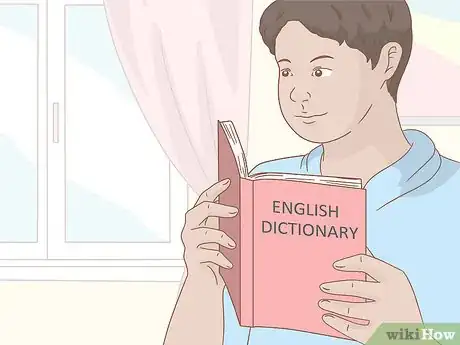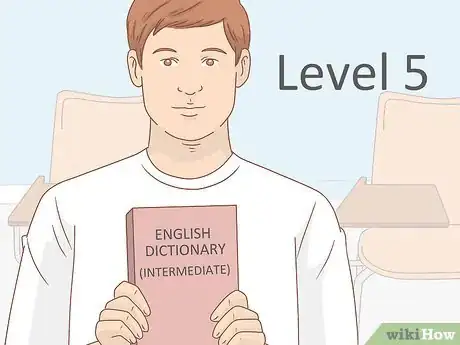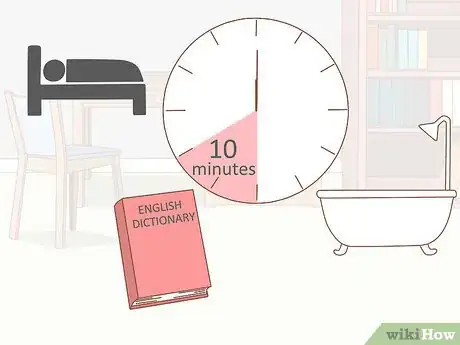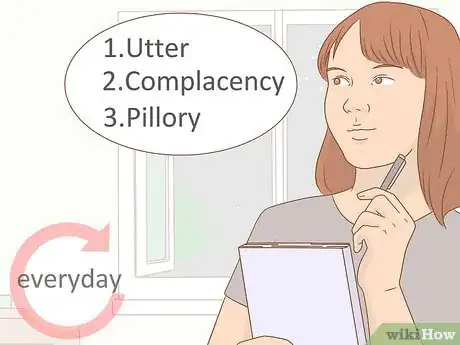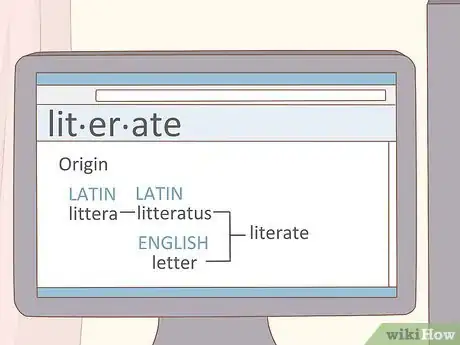This article was co-authored by Katherine Demby. Katherine Demby is an Academic Consultant based in New York City. Katherine specializes in tutoring for the LSAT, GRE, SAT, ACT, and academic subjects for high school and college students. She holds a BA in History and Political Science from the University of North Carolina at Chapel Hill and a JD from Yale Law School. Katherine is also a freelance writer and editor.
wikiHow marks an article as reader-approved once it receives enough positive feedback. In this case, several readers have written to tell us that this article was helpful to them, earning it our reader-approved status.
This article has been viewed 155,820 times.
The most sophisticated, talented masters of English words occasionally experience a few uneasy moments when it comes to a time when demonstrating a rich vocabulary is required. Your communication skills can bring many of your qualities to the forefront of your life. Your word power can determine your level of success in many areas of life. Mastering English words is the first step to mastering English communication skills. This article provides guidance for those who speak English as a second language and native English speakers who wish to increase their vocabulary skills. Read on from step one below for how to master English words.
Steps
-
1Determine your present level of vocabulary. This is something you can do by taking few online Vocabulary Tests which are available through a variety of websites. Take these test to know the strengths and weaknesses in your present vocabulary. Prepare your own list of vocabulary that you can go through everyday.[1]
-
2Read a dictionary. A dictionary is a good resource for learning and mastering English words. You don't have to read it cover to cover, just pick out a few words that interest you and learn how to use the properly. Alternatively, try an encyclopedia.[2]
- Many dictionaries provide word etymologies, both print and online. Whenever you come across an unfamiliar word, look up the etymology of that word. Then, look at other words that share the same root words. Associating unfamiliar words with known words that share the same root can be a great way to build vocabulary.
Advertisement -
3Buy a few books to assist in your studies. Go to any good library or bookstore and find a knowledgeable member of staff to help you. This person may be able to listen to you speaking English and then help determine the books that will be the most useful to you.[3]
-
4Begin at your present level. If your level of vocabulary level is high, start at the highest level where you recognize and understand every word put before you. If your vocabulary is small, work gradually to improve in constant, small steps.
-
5Prepare a study schedule. Follow your schedule, even if it is only for 30 minutes per week, once a week. It's better if you can spend 10 minutes per day - daily usage and practice will help fastest.[4]
-
6Subscribe to a website which sends A Word A Day to your Inbox. One such site is through Merriam-Webster, the dictionary company. You can find many others, as well.
-
7Say each word as you read it. This is very important. Make sure your pronunciation is correct. There's nothing more embarrassing than trying to impress people with your newfound language skills, only to find out that the word you were going for was pronounced "Fa-SEE-Shus," not "Fa-KET-EE-uss." (That's "facetious," by the way.) Pronouncing the words out loud will help them form naturally when you speak them in front of others. It is especially important for non-native speakers to do this as English pronunciation of letters and sounds may differ from your native language. English is notoriously tricky to master as so many of its 'rules' have exceptions.[5]
-
8Write down the definition of any new word you learn. Write a few sentences using the words too. This will help them stick in your head, along with the meanings. Read your sentences aloud, making sure to pronounce carefully. There is, potentially, a little muscle memory at play here - forming the words correctly the first few times will ensure that you always form them this same way. If you start saying a word wrong, it's really hard to get your brain around to saying it the correct way later. If your English skills are quite advanced, why not combine the vocabulary you've learnt over a number of days, perhaps a week, or 10 days, into a short story.
-
9Repeat the word you learn each day, adding one new word every day. As you feel sure you will not forget word #1, drop it from the list, and continue.
-
10Consider studying etymology, the history of words, and mnemonics. Many people believe the best way to master words is to learn them through etymology and mnemonics. Learn a root so that you can learn many other words based on that root. For example the word 'literate'. Once you know that word, you can learn the modifications to that word, such as: illiterate, literature, literacy, literalism and a host of other words, to assist you in your mastery of English words.[6]
Community Q&A
-
QuestionI understand English language but find it difficult to speak it fluently. What can I do? Sometimes, I write better than I speak.
 Community AnswerIt happens to a lot of people. Public speaking classes help a lot, as does reciting well-known speeches.
Community AnswerIt happens to a lot of people. Public speaking classes help a lot, as does reciting well-known speeches. -
QuestionWhich website can I use to get new words?
 Community AnswerThere are multiple websites all over the web that can help. Dictionary.com, providing daily new words and definitions, thesaurus.com, an online collection of synonyms to aid you, and any other online dictionary site can be useful. New words can be found best by searching thesauruses or communicating with others.
Community AnswerThere are multiple websites all over the web that can help. Dictionary.com, providing daily new words and definitions, thesaurus.com, an online collection of synonyms to aid you, and any other online dictionary site can be useful. New words can be found best by searching thesauruses or communicating with others. -
QuestionI can write in English, but my vocab needs help. I try learning new words, but forget the meanings quickly. How can I make what I learn last longer?
 Elissa SchwartzCommunity AnswerWrite the words that you learn in a sentence (or two), and keep them in a notebook. That way you can reread what you wrote and understand how the words are used. This will help you to remember them.
Elissa SchwartzCommunity AnswerWrite the words that you learn in a sentence (or two), and keep them in a notebook. That way you can reread what you wrote and understand how the words are used. This will help you to remember them.
Warnings
- Not all English articles, stories, books etc are well written so not everything you read will assist you.⧼thumbs_response⧽
Things You'll Need
- Oxford Dictionary
- Roget's Thesaurus
References
- ↑ https://preply.com/en/blog/2015/10/01/english-language-levels-how-can-you-determine-your-level/
- ↑ https://www.teachingenglish.org.uk/article/using-dictionaries
- ↑ https://onlineteachersuk.com/improve-english-reading-simple-books/
- ↑ https://learnenglish.britishcouncil.org/beginner-a1-reading/study-timetable
- ↑ http://www.bbc.co.uk/learningenglish/features/pronunciation
- ↑ https://www.sciencedirect.com/science/article/pii/S1877042811024608?ref=pdf_download&fr=RR-2&rr=79afa8875ccac3f8
